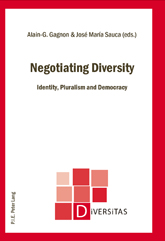 [7] [7]
Table of contents
Alain-G. Gagnon and Jose Maria Sauca, Introduction [9]
Part I.
Divided Societies and Federalism
Chapter 1. Ramón Máiz, “The Normative Theory of Federalism and the Idea of Nation.” [15]
Chapter 2. François Rocher, “The Federal Ideal. Empirical and Normative Explorations.” [35] Texte diffusé en tiré à part !
Part II.
Recognition and Empowerment
Chapter 3. Alain-G. Gagnon, “Empowerment through Different Means. Nationalism and Federalism in the Canadian Context.” [47]
Chapter 4. Jose Maria Sauca, “The Canadian School of Diversity's New Influences on the Theory of Collective Rights in Spain. A Critical Review of Seymour's Contribution.” [61]
Chapter 5. Jocelyn Maclure, “After the Bouchard-Taylor Commission. Religious Accommodation and Human Rights in Quebec.” [87] Texte diffusé en tiré à part !
Part III.
Human Rights, Political Rights and Institutional Pluralism
Chapter 6. Jose Woehrling, “Federalism and the Protection of Rights and Freedoms. Affinities and Antagonism.” [105]
[8]
Chapter 7. Ascensión Elvira, “Rights Beyond the State. The European Union and the European Court of Human Rights.” [125]
Chapter 8. Eduardo J. Ruiz Vieytez, “On the (Human) Rights to Self-Determination and National Conflicts.” [153]
Part IV.
Politics of Diversity :
Multiculturalism and interculturalism
Chapter 9. Gérard Bouchard, “What is Interculturalism ?” [191] Texte diffusé en tiré à part !
Chapter 10. Joxerramon Bengoetxea, “Multiculturalism and Legal Pluralism. European Perspectives.” [223]
Chapter 11. Maria Isabel Wences, “Interculturalism and Republicanism. Is Dialogue Possible ?” [239]
|

